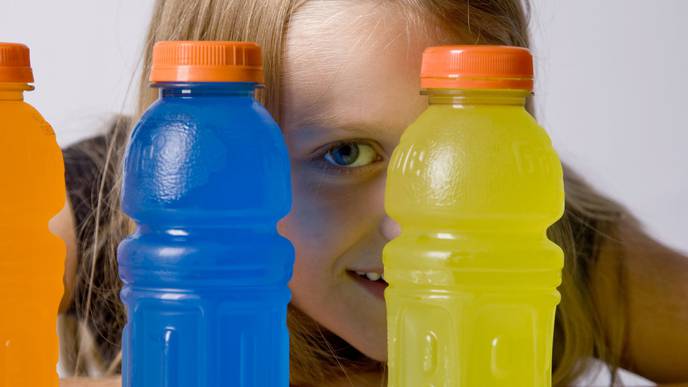Do Young Athletes Need Sports Or Energy Drinks?

02/07/2023
Sports and energy drinks fueled with caffeine are commonly consumed by kids and teens. While sports drinks, which contain carbohydrates and electrolytes (potassium and sodium), were invented to keep athletes hydrated and enhance their performance, research shows they are unnecessary for kids engaged in routine or play-based physical activity.
“Most experts agree that the length and intensity of the workout determines if a sports drink is needed,” said Lindsay Bailey, a dietitian at Akron Children’s Hospital. “According to the American College of Sports Medicine, that means exercise or sports that lasts 60 minutes or longer at a high intensity (think long distance running, soccer, basketball, hockey).
“The amount of sweat that’s lost during exercise influences how much sodium and potassium are lost,” she added. “The longer you exercise and the more heavily you sweat, the greater the need for a sports drink to help replace these lost micronutrients. Some physically active kids may need to replenish them while others do fine with just water.”
Lindsay cautions that the routine consumption of sports drinks and caffeinated energy drinks (CEDs) pose potential risks and can contribute to tooth decay and lower nutrient-dense options in the diet if consumed too regularly. CEDs also may have a stronger effect on kids who weigh less than adults due to greater exposure to stimulant ingredients per kilogram of body weight.
“Not all sports drinks are created equal,” said Lindsay. “Gatorade and Powerade will supply carbohydrates and electrolytes. G2 is a lower carbohydrate blend, and it may not have the necessary amount of carbohydrates needed if participating in 60 minutes or more of vigorous activity.”
Some athletes have reported gastrointestinal upset with sports drinks. This could be due to artificial dyes and other ingredients. Research suggests that sports drinks offering a blend of carbohydrates, such as glucose and sucrose, rather than a single carbohydrate source may improve the amount of carbohydrate that eventually gets to the muscles as fuel.
Also lining grocery store shelves are vitamin waters that come in many flavors and offer various combinations of supplemental vitamins and minerals. These drinks can provide too much of some vitamins and minerals, especially if your child takes a daily multivitamin or gets most of his recommended daily allowance from his diet. Some vitamin waters also contain sugar, artificial sweeteners, caffeine, and herbal ingredients (whose effects haven’t been studied in kids and teens).
When are sports drinks the right choice?
- If you are a heavy sweater and have been exercising for more than 60 minutes.
- If you notice white residue on your skin after heavy exercise. This is a sign of sodium loss.
- If you are exercising in intense heat.
- If you are dehydrated (signs of dehydration include dizziness, fatigue, headache and rapid heartbeat)
- If you experience severe muscle cramps following intense exercise

Facebook Comments